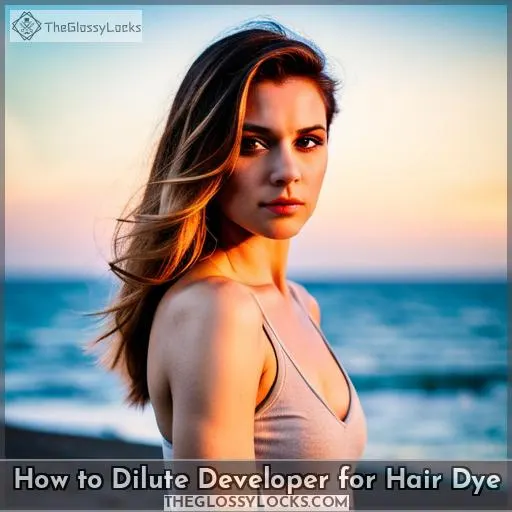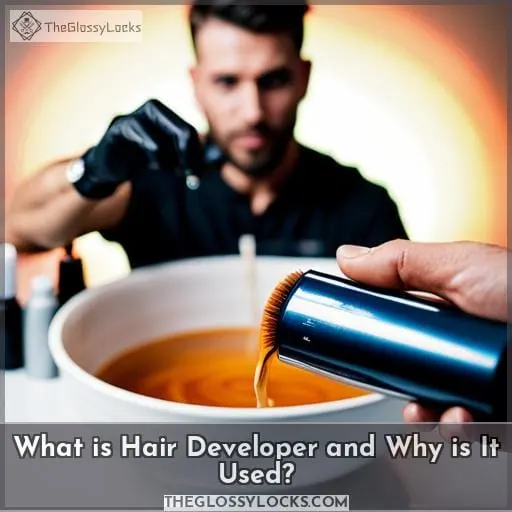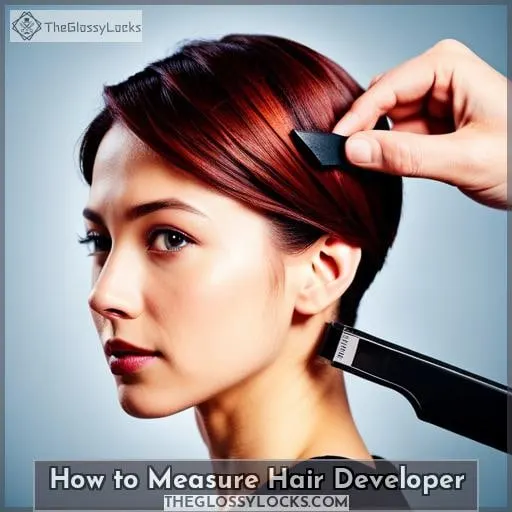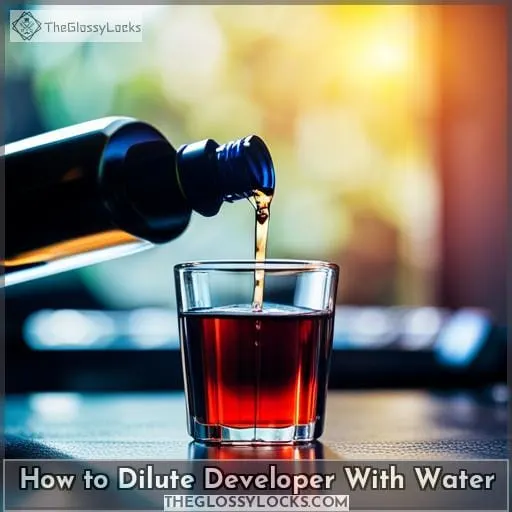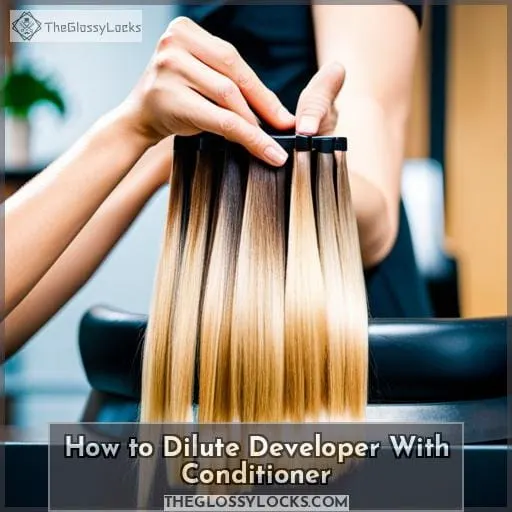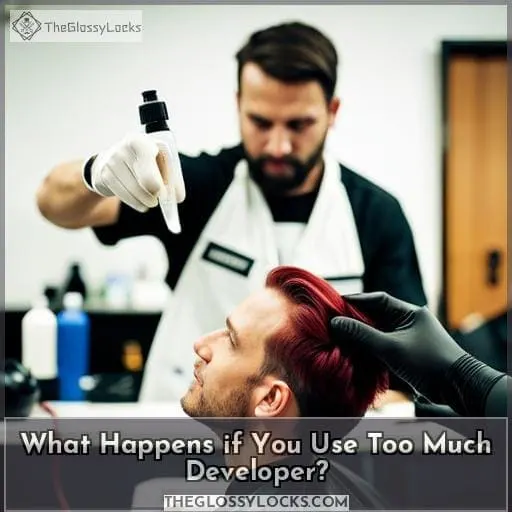This site is supported by our readers. We may earn a commission, at no cost to you, if you purchase through links.
Dyeing your hair yourself doesn’t have to be a daunting task. With the right knowledge and tools, you can achieve salon-quality results in the comfort of your own home.
Developer acts as a suspending agent and activator when mixed with dye, giving you more control over how light or dark you go without damaging your locks.
So let’s get started on our journey towards perfect tresses!
Table Of Contents
- Key Takeaways
- Why Diluting Developer is Important for Hair Dye
- What is Hair Developer and Why is It Used?
- How to Measure Hair Developer
- How to Dilute Developer With Water
- How to Dilute Developer With Conditioner
- Tips for Successful Dilution of Developer
- What Happens if You Use Too Much Developer?
- How to Apply Diluted Developer to Hair
- Frequently Asked Questions (FAQs)
- Conclusion
Key Takeaways
- Diluting the developer is crucial for achieving the desired hair color without damaging the scalp or hair, and regularly using sulfate-free shampoos as part of a gentle cleansing routine helps prevent color stripping. Diluting the developer is crucial for achieving the desired hair color without damaging the scalp or hair.
- It is important to measure accurately and choose the right type of developer to achieve the desired look.
- Diluting with water or conditioner is safe and effective, but it requires precision and patience.
- Before attempting to dilute the developer at home, it is recommended to do a strand test and consult with a professional.
Why Diluting Developer is Important for Hair Dye
Diluting developer for hair dye is an important step in achieving the desired look without damaging your scalp or hair. Before installing the developer, it’s necessary to assess the desired consistency and color intensity of your chosen hair dye.
If you need a higher level of lift than what is available with a standard volume developer, dilution may be required.
For 40-volume developers, most people prefer to dilute down to 20 or 10 volumes using either water or conditioner for the best results when mixing with darker dyes. It’s also essential that you do not go below 10 volumes unless specified in the instructions, as this could damage your scalp and cause irritation due to overprocessing of chemical agents present in both dyes and developers alike.
To properly dilute a 30-volume developer into two separate solutions (20/10) requires precision. However, if done correctly, it can save time while volumizing up weaker concentrations such as five volume solutions, which are often used during strand tests prior to full application onto larger areas such as head coverage applications.
This is where large sections require processing at once versus smaller chunks requiring fewer temperature control points during styling routines after rinsing out unexposed portions left behind by highlights, etc.
The process involves measuring equal parts of each solution, then pouring them into a bowl before combining until no lumps remain, thus creating the desired consistency ready for use within minutes! Remember, performing a strand test helps ensure a successful outcome, so practice good technique when dealing with chemicals, especially those containing peroxide derivatives found inside many brands.
What is Hair Developer and Why is It Used?
You may have heard of hair dye, but what about the mysterious product used to make it work its magic? Hair developer is an essential ingredient in achieving your desired color and texture. It’s a chemical agent that helps activate the pigments contained in hair dyes for better penetration into the strands.
Developer comes in several different levels of strength or volumes, such as 10-volume, 20-volume, 30-volume, and 40-volume, with each level being more powerful than the last. The higher volumes will allow you to achieve lighter colors, while lower volumes are ideal for darkening existing shades without damaging delicate tresses, along with deep conditioning benefits from milder versions.
Volume control also plays an important role when mixing up your own custom shade. Too much developer can damage hair when not balanced correctly by other ingredients like water or conditioners, creating unwanted color results instead of the desired intensity, affecting both quality and longevity depending on brands used within formulas.
If you’re looking to lighten pre-existing hues slightly, then diluting 40-volume developers down into a 20-volume formula is recommended using a 1:1 ratio measurement mixed together via a petri dish before applying onto locks.
While if aiming at darker tones, mix 30-volume products together using the same technique until reaching a 10-volume desirable result.
To take full advantage of these prescriptive methods, make sure all ingredients chosen match those found within specific manufacturer instructions, including any extra additives like bleach suggested, ensuring the best possible outcome every time applied onto manes!
How to Measure Hair Developer
Accurately measuring your hair color product is key to achieving the desired look. When it comes to diluting developer for hair dye, getting the right amount of developer and mixing ratios are crucial in avoiding damage and achieving beautiful results.
To ensure accuracy when measuring out how much developer you need, a measuring cup or scale should be used instead of simply guessing at amounts.
If you’re combining two different volumes together, such as 30 volume with 10 volume, mix equal parts in a petri dish before applying it onto your scalp.
When mixing lightener into developing solution for even more vibrant colors or lighter shades, always start by adding just half an ounce per every four ounces of diluted developer first before gradually increasing this mixture until the desired level is achieved.
This is necessary as too much lightener can lead to undesired results like dryness and breakage over time from excessive chemical exposure on hair follicles.
Lastly, keeping track of all measurements during the application process will help avoid any unnecessary mistakes while simultaneously ensuring optimal results without causing further harm towards strands’ overall health.
How to Dilute Developer With Water
Mixing water with your hair dye activator is an important step to achieve vibrant and long-lasting results. In fact, according to experts, the optimal dilution ratio is 1:1.5 for best results. Proper dilutions of developer will help protect hair against damage while achieving the desired outcome.
- Start by measuring out the amount of developer you need into a bowl or container.
- Add equal parts of warm water (which should not be too hot) until it reaches the desired volume.
- Mix well until all ingredients have been blended together evenly.
- Apply directly onto freshly washed dampened hair.
If done correctly, proper mixing can result in improved color intensity while avoiding potential scalp irritation caused by overuse or using too high a concentration level than necessary. Diluting also helps increase longevity as higher concentrations can break down faster due to oxidation from air exposure.
How to Dilute Developer With Conditioner
Moisturize your hair for a vibrant and long-lasting color by slowly diluting the developer with conditioner. Diluting hair developer can be done easily at home, but it is crucial to consider the hair’s condition and porosity before any bleaching process, including understanding developer strengths for bleaching. Diluting hair developer can be done easily at home, but it is important to know the correct ratios of water or conditioner to use.
When using developers with different levels, such as 30, 40, or 10 volumes, always start by measuring out the right amount of each before mixing them together in a bowl. Using too much volume can damage your hair, while not using enough will not give you the desired results.
If you are diluting with conditioner instead of water, make sure you are using an appropriate moisturizing product and add it slowly until you reach a 1:1 ratio between both ingredients. This method guarantees the best possible results without damaging the scalp when coloring, since there are fewer chemicals present in the dye mixture created this way than when only adding more volume from higher levels like 40 Volumes Developer directly into the dye mix without any kind of dilution beforehand.
Additionally, if extra lift is needed, it might still be necessary to use a higher level after correctly diluting the first one so that excess chemicals won’t harm your scalp. Finally, remember that although waterproof products exist, these often require more chemical components, and excessive amounts could cause problems later on.
Tips for Successful Dilution of Developer
You can achieve successful dilution of developer for hair dye if you take the time to understand how it works. One key step is doing a strand test. This allows you to gauge the effects and results on your particular hair type before committing fully.
It’s also important to consult with a professional about optimal dilution ratios so that you get the desired outcome without damaging your hair in any way.
Strand Testing
Before applying the hair dye to your entire head, it’s important to perform a strand test with the diluted developer mixture. This helps ensure that you’ll achieve desired results and can create an emotional connection with your audience.
To do this, mixing technique is key. Start by determining what volume developer is needed for optimal results. Leah Marie Priest recommends 20-volume developers when lightener use is necessary. Then, gather all necessary supplies including 30-Volume Developers (if diluting) or 10-Volume Developer (for deposit only gloss).
Mix together equal parts in a bowl before using Color Test application on one section of unwashed dry hair.
Leave the solution on for 5 minutes before rinsing thoroughly and examining color change along strands.
Consulting a Professional
Consulting a professional hairdresser before diluting developer can help you get the gorgeous hair color of your dreams without damaging your locks. This is especially crucial when bleaching, as it requires expertise and safety precautions that an experienced stylist can provide.
Knowing the volume levels of each type of developer is also important to achieve minimal lift with maximal strength and scalp sensitivity in mind. It’s essential for achieving the purpose of this tutorial: getting to an end goal where both desired results and hair health are preserved.
Here’s a 5-point list on why consulting a professional should be part of every dye job:
- Hairdresser expertise
- Safety
- Volume Levels
- Developer Strength
- Scalp Sensitivity
All these factors are necessary for attaining beautiful, healthy hair color safely! Taking this extra step will ensure that you have all the information needed to make informed decisions about what works best for you, so there won’t be any surprises after rinsing off!
Optimal Dilution Ratio
When it comes to dyeing your hair, the right ratio is key – so always measure twice and cut once! The optimal dilution ratio for developer is 1:1.5, which should be followed when mixing together two different types of developer.
A perfect mix will create a protective shield while still allowing color intensity, without risking any damage to the hair.
To achieve this balance and promote overall hair health, incorporating essential vitamins such as Biotin for Hair Growth is vital, start with high-quality hair developers and add purified water in equal parts for best results. Strand testing before applying on all strands can help ensure you don’t use too much developer or get an undesirable outcome.
Make sure not to forget about measuring accurately as that plays a big part in getting the desired result from your mixture – especially if achieving lighter shades or highlights is what you’re looking for!
What Happens if You Use Too Much Developer?
Using too much developer can have disastrous results. It’s important to understand the bleaching effects of a high-strength hair developer and follow your dye instructions for best results. Too much of even diluted developer can cause scalp irritation and damage to your hair, so it’s essential to be precise when measuring out the amounts you need for an application.
Fear of the unknown shouldn’t keep you from trying this technique. If done correctly, it will yield the desired effect with minimal effort! The good news is that using extra diluted developer isn’t necessarily bad.
In fact, excess dilution may reduce its strength enough that there won’t be any negative consequences on your scalp or hair health at all! However, avoid exceeding recommended proportions as doing so could still result in unwanted color changes or other problems like weakening or over-bleaching delicate strands.
Additionally, always make sure you are using a specially formulated product designed specifically for use with dyes. Never mix bleach into these products as they do not contain protective ingredients found in dedicated lightening formulas! Finally, remember that diluting developers requires precision and patience.
Measure everything carefully before mixing together, then apply cautiously following instructions closely.
Diluting developers properly is key towards achieving optimal results without damaging fragile tresses while also avoiding any potential disasters along the way.
How to Apply Diluted Developer to Hair
Applying your own diluted concoction to your hair can be a bit daunting, but you’ll be glad you did it once the results are visible! Diluting hair developer is an important step in achieving beautiful results and avoiding damage.
To get the most consistent results, understanding ratios and measuring accurately is key. When choosing products for dilution, make sure they are specifically designed for the dye being used. The ratio of product should generally remain 1:1 when diluting with water or conditioner.
However, if more control over the intensity of color is desired, then slightly increasing this ratio may help achieve this goal.
It’s also a good idea to do a strand test before applying diluted developer all over, as some people have sensitive scalps that could react badly to certain chemicals or dyes if not tested first on individual strands beforehand.
Once ready for application, use gloves and begin by sectioning off small parts of dampened tresses at a time. Start from either side near the forehead down towards the back neck area one portion at a time, so that everything remains well controlled throughout the process.
Using an applicator brush, apply the mixture evenly along the entire length, focusing especially on roots where lift will need extra attention.
Afterwards, allow a processing period before rinsing out completely using cold water only (this helps lock in color better).
Frequently Asked Questions (FAQs)
What type of developer should I use for my hair dye?
When choosing a developer for your hair dye, it’s important to select one that matches the type of dye you’re using. Using a developer with an inappropriate volume can cause damage to your hair, so be sure to choose wisely.
For the best color payoff and longevity, consider mixing two different volumes in a 1:1 ratio to achieve the perfect balance of strength and gentleness. It’s important to arm yourself with knowledge before making any decisions, as this will ensure a smooth journey down Color Lane.
Is it safe to dilute developer with water?
Diluting developer with water can be done safely, but it requires precision and expertise. For instance, a professional hairstylist may choose to dilute 30-volume developer for lighter hair color depositing only by adding water in a 1:1 ratio.
However, it is not advisable for beginners; instead, they should use conditioner or lower volume developer, which is less damaging and easier to work with.
How do I know when to dilute developer?
To know when to dilute developer, consider doing so when a higher volume is unavailable or when you want to achieve a lower potency. Dilution can help maintain the health of your hair and prevent disastrous results.
Diluting is a simple process, but it requires precision. Be sure to measure ingredients carefully and mix slowly for optimal results.
Do I need to dilute developer with a conditioner?
Diluting developer with conditioner can decrease the strength and intensity of the color, while keeping hair looking healthy. It is important to do it slowly and use a moisturizing conditioner for best results.
What are the risks of using a higher volume developer without dilution?
Using a higher volume developer without dilution can cause significant damage to the hair, risking breakage and scalp irritation. Additionally, an excessive amount of developer could result in an undesired color or intensity, making it difficult to achieve the desired results.
Therefore, it is crucial to always consider the potential risks of using higher volumes before doing so.
Conclusion
To conclude, diluting developer for hair dye is an important step in creating vibrant, long-lasting results. By measuring the developer, mixing it with water or conditioner, and applying it to the hair in the correct way, you can create the desired look.
It may seem intimidating at first glance, but with a bit of practice and guidance, you can be a pro at diluting developer in no time. In fact, it’s as easy as pie! So, don’t be afraid to try diluting developer for hair dye – it’s a simple process that can give you the look you’ve been searching for.

